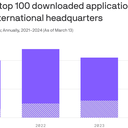TikTok ban could upend global app economy

A TikTok ban or forced sale would set a historic precedent that could disrupt the U.S. media ecosystem for years to come.
Why it matters: A law banning TikTok or forcing its sale, like the one the House recently approved, would not only face court challenges but could also trigger broader economic tensions between the U.S. and its rivals.
- "We might turn out to have created a precedent that comes back to haunt us," said Anupam Chander, a visiting scholar at Harvard University and a Georgetown University law professor.
- Other countries could use the U.S.'s move as a basis to force U.S. companies to sell their local operations or to transfer their technology to a foreign firm, Chander told Axios.
Be smart: That concern is in part what's driving some U.S. tech firms, like Meta, to remain relatively quiet on the TikTok issue.
- While Meta has in the past paid a public affairs firm to share negative stories about TikTok's content moderation issues, it hasn't lobbied in favor of a ban.
- Meta-owned apps like WhatsApp and Instagram are often the most downloaded apps in markets outside of the U.S., alongside Chinese apps like TikTok, CapCut and Shein.
- Less than half of Meta's revenue (45%) came from North America last year.
By the numbers: So far in 2024, more than one quarter (26) of the 100 most downloaded apps in the U.S. are owned by foreign companies, according to data from Apptopia.
- That's up from 20% in 2021.
Between the lines: In 2024, not only are a greater number of apps from China and Hong Kong (6), but more apps from that region (4) have made it to the top 10 most-downloaded apps in the U.S. so far this year compared to just 1 in 2021.
- TikTok was the most downloaded app in the U.S. in 2021 and 2022, per Apptopia. Chinese e-commerce app Temu replaced it on that list in 2023.
- So far this year, Instagram's Threads is the most-downloaded app in the U.S., followed by TikTok and Chinese e-commerce giant Temu.
- Shein, another Chinese e-commerce app, ranks 6th. CapCut, a video editing app owned by TikTok parent ByteDance, ranks 7th.
Outside of China, popular U.S. app downloads include Canadian shopping giant Shopify, Australian design company Canva, and various gaming apps from Israel, Russia, Turkey and other countries.
Zoom out: App developers enter the U.S. market to take advantage of its size and spending power.
- Chinese companies started entering the U.S. app economy years ago with games, followed by social media and now shopping apps.
- "They're going for the higher ARPU [average revenue per user] customers," said Tom Grant, vice president of research at Apptopia. "That's the U.S., and then after that comes the EU and U.K."
- TikTok made $16 billion in U.S. revenue last year, the FT reported.
The big picture: Foreign app developers have raised concerns with proposed bills that they feel could give the U.S. government too much power to unilaterally ban apps without sufficient evidence of national security threats.
- Proton, a Swiss encrypted email company, has in the past argued that other bills designed to ban TikTok, such as the Restrict Act, give the federal government too much unchecked power to ban apps, "which may have unintended consequences for internet freedom in the long term."
- Chander notes that if the U.S. were to pass a bill banning TikTok unless it's sold, it would essentially prove to other countries — particularly privacy skeptics in Europe — that U.S. apps could pose data privacy threats to their citizens.
What to watch: For now, the House bill that passed last week seems to have lost momentum in the Senate, in part over First Amendment concerns.
- The intelligence community warned in an annual threat assessment last week that China has used TikTok to influence recent U.S. elections, but Congress has so far failed to present any new evidence suggesting TikTok has used or is currently using the app to spy on Americans.
- TikTok said in response to the threat assessment that it regularly takes actions against manipulation campaigns and reports them publicly.
Go deeper: Lawmakers punt on thorny TikTok sale issues